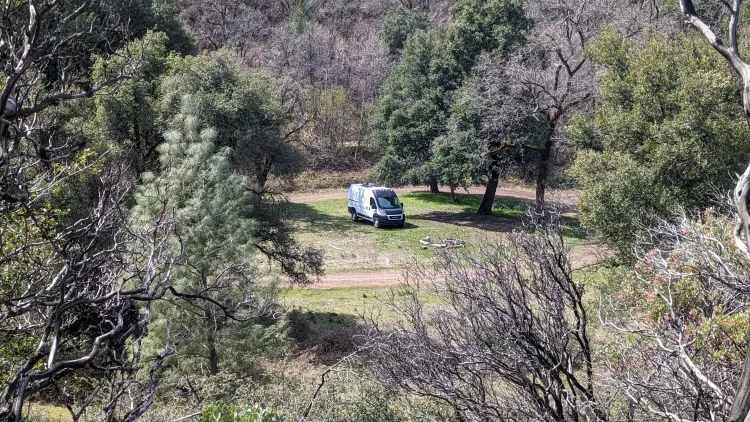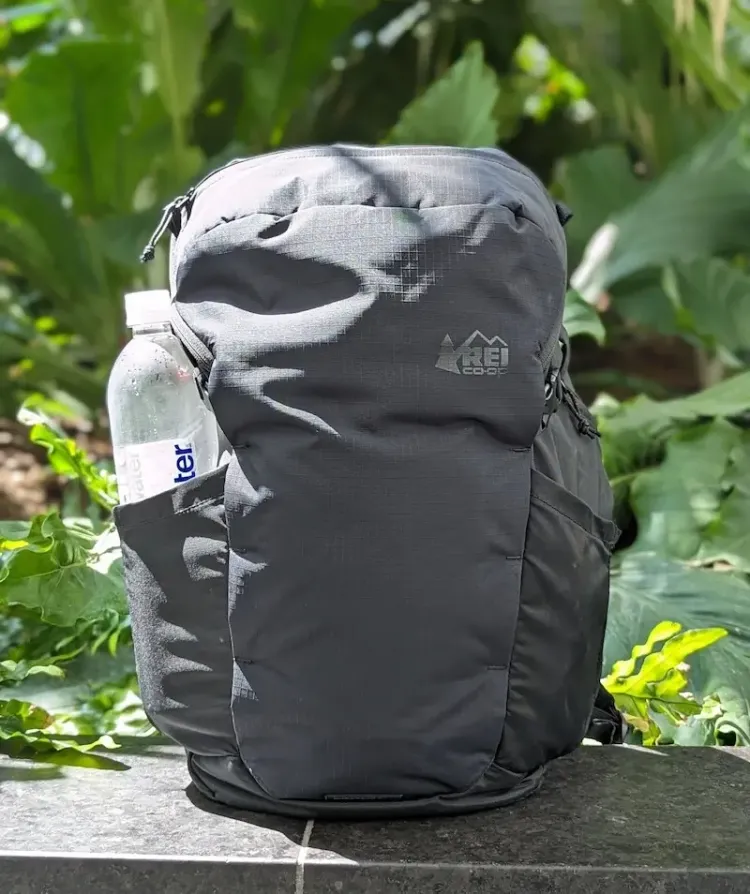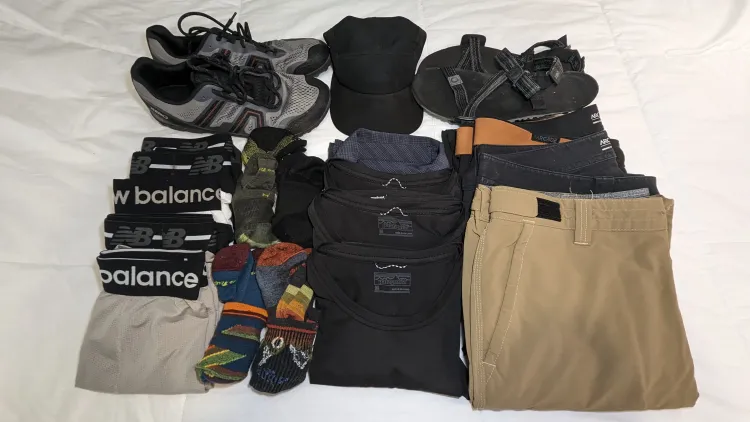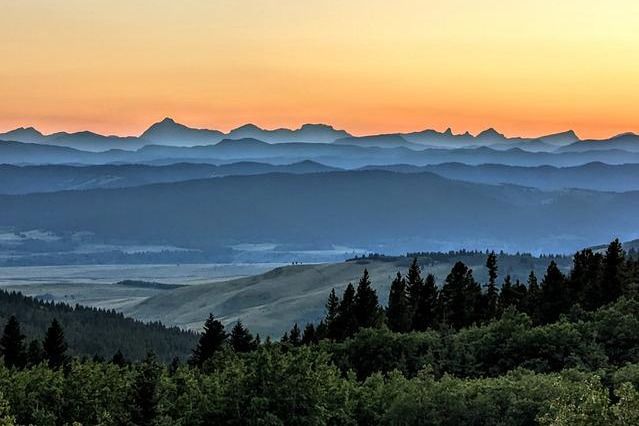Minimalist Travel - An Introduction To Mindful Travelling
The idea of minimalist travel is about not being burdened by your belongings, gathering more meaningful experiences, experiencing cultures or locations in more depth, and ensuring your travels are more sustainable.
Being constantly "on the go", having your phone tethered to your hand with an endless stream of distractions, and eternally pursuing even more materialistic items has left our world in a state of chaos. By shedding these ways of living, we can embrace a form of living called minimalism. There's no better time to practice minimalism than when travelling as you likely want your time and money to count.
In this article, we'll explore the "who, what, where, when, why, and how" of minimalist travel. You'll learn about the essence of this alternative lifestyle and the practicality to allow you to travel with more intention and fulfillment.
Table Of Contents
Want to explore more about minimalist travel? Check out The Ultimate Guide To Minimalist Travel from Autogenic Amusements.

What Is Minimalism?
To start this article off, I feel you should know what minimalism is as a baseline before we dive into the practice while travelling. Below we'll cover some aspects of what minimalism is outside of the travel context.
- Minimalist lifestyle: ... a lifestyle adopting minimalism, there is an effort to use materials which are most essential and in quantities that do not exceed certain limits imposed by the user themselves.
- The term Minimalism also has its roots in art and music, wherein the concept embraces simplicity.
- The Minimalists defines minimalism as follows: Minimalism is a tool that can assist you in finding freedom. Freedom from fear. Freedom from worry. Freedom from overwhelming. Freedom from guilt. Freedom from depression. Freedom from the trappings of the consumer culture we’ve built our lives around. Real freedom.
As you might see, the term easily extends to many different aspects of life. Taking the main concepts, it fits well with an alternative way of travelling.
What is Minimalist Travel?

Minimalist travel is a form of travel often meant to create a more freeing and rewarding experience. It's about getting rid of the unnecessary and focusing on what truly matters.
Let me shed some insight on this.
- Minimalist travel is about packing light. This form of travel allows you to be more mobile by not being burdened by too much luggage and possessions.
- It allows you to focus on experiences over possessions. Similarly to packing light, you likely won't find a minimalist traveller with bags full of souvenirs and a new wardrobe that will only be worn a few times. It means embracing moments over material possessions.
- Minimalist travel isn't only about travelling light and fast with only what you have in your backpack. It's also about moving more slowly and intentionally to gain a greater sense of the new place/ country/ region you're exploring.
- This style of travel is not exclusive to people who are conscious of their environmental impact. It does, however, align a lot with those who are environmentally conscious. Travelling slowly might mean fewer flights thus decreasing emissions, and staying in a more humble accommodation means better use of space and infrastructure.
- Consider the three characteristics of the topic minimalism: functionality, simplicity, and honesty. These characteristics translate well into travel minimalism. As a minimalist traveller, I ensure what I bring is multi-functional (using my phone for so much more than you might think), I opt for simplicity in my schedule, and I'm honest about my experiences instead of glorifying them for social media.
While there are certainly some common attributes to minimalist travel, it has no true restrictions, except for maximalist travel. The idea is to not be burdened by your belongings, gather more meaningful experiences, experience a culture or location in more depth, and ensure your travels are more sustainable.
Who Is Minimalist Travel For?
Minimalist travel is for anyone who wishes to travel differently than the norm. It's not limited to the rich, or to those who have extensive experience in travelling. In this section, we'll dive into who minimalist travel is for.
- Minimalist travel is for those who want more out of their travels. Whether you want more time on the beach, or the ability to see more sights, this form of travelling is ideal.
- If you often find yourself connected to work and home problems, being able to let go and focus on where you are is one of the greatest benefits of minimalist travel. Even setting aside dedicated time for work, then focusing on other aspects of travel instead of mixing them can have a profound impact on your quality of life while abroad.
- You don't need to already be a minimalist before jumping into this kind of travel. You can learn as you go and hone in on what makes a trip more memorable for you. Not everyone is born ready to be living out of a backpack.
- Solo travellers will often embrace aspects of minimalism on the road. You can explore at your own pace instead of being tied down to a tour schedule. It allows you to do what you want, when you want, and how you want to.
- Nature enthusiasts adopt a greater sense of minimalism in their travel by often choosing to explore the natural world around us. When they travel, they often find themselves distanced from society and more in the moment with their surroundings. Not to mention, their home is usually stuffed inside their backpack in the form of a tent.
- While anyone can participate in minimalist travel, it is not for everyone. Some people might find adapting to a minimalist lifestyle hard to swallow, especially while travelling. For instance, photographers might find it difficult to travel with less gear when their camera equipment already takes up a majority of their luggage space.
Minimalist travel calls on those from many different walks of life. Typically, it entices those who want more experiences out of their travels, those who want to disconnect, and those who want to try minimalism. Solo travellers and even nature enthusiasts are also drawn to this form of travel.
Where Do Minimalist Travellers Travel?

Minimalist travel can be practised practically anywhere. Sometimes, minimalist vacations allow you to discover more in fewer places than expected.
- Going off the beaten path allows minimalists to discover the authentic culture and not be spoon-fed what a tourist area might want travellers to see. Alternatively, travelling this way can allow you to see and experience the most out of a particular tourist destination.
- Spending more time in nature means minimalists often flock to the natural wonders of the world. They aren't spent couped up in cities where there exists little difference from the next big city. Leaving the confines of the city allows you to recharge in nature and be less distracted.
- Minimalist travellers might opt for a slower form of travel. This means they will spend longer in a certain destination to experience it more fully as opposed to trying to increase the number of countries they've been to for the sake of incrementing a number.
In short, minimalist travellers can experience this lifestyle anywhere they choose! It might even be possible for you to travel to more places when not burdened by the amount of luggage, or the desire to see sights you won't actually enjoy.
When Do Minimalist Travellers Travel?
While there is no set time frame for a minimalist traveller to travel, there are some aspects of timing that a minimalist might consider. Below we'll cover some related topics associated with time management.
- Minimalists might choose to travel during the off-season for several reasons. It might be that they want cheaper expenses such as accommodations or plane tickets. It also might be a choice so they can enjoy a location with smaller queues and less competition when lining up for a famous restaurant.
- Spontaneity is an aspect that many minimalist travellers have. Without the normal burdens of travel, a minimalist might be able to change their schedule at a moment's notice if the opportunity arises.
- When adopting the concept of slow travel, you might choose to travel for longer periods. Sometimes, minimalists can call their travels indefinite, long-term, or extended, leading to one long trip where they are technically always travelling.
Keeping these tips in mind can help you with having more fulfilling travels and adventures. Travel during the off-season can mean a quieter trip without needing to deal with other travellers and tourists, and being able to change plans quickly keeps you chasing what your heart truly desires.
Why Minimalist Travel - The Pros And Cons
If the benefits of minimalist travel weren't already apparent, we'll dive into some pros and cons below. You'll quickly see why this way of travelling is so popular and attracts those who want to do more with less.
Pros Of Minimalist Travel
- Save money by being more flexible with your schedule
- Save money on baggage fees.
- Save time instead of waiting for luggage.
- Experience a location in more depth.
- You don't need to worry about locking up your luggage as you might have everything in one bag.
Cons Of Minimalist Travel
- It can be challenging to limit yourself to what you bring along.
- It might be difficult to find travel companions who think the same as you.
- Minimalism can lead to jealousy of those who see more and take better pictures during their travels. Don't let this be the thief of your joy as you might be getting a more intimate experience.
While minimalism and travel are sometimes hard to balance, it's clear that the benefits far outweigh the hardships. When you embrace the new possibilities of changing the way most people travel, you find a lot more freedom.
High On Mike does a great job explaining some of the motivations behind travelling minimally.
How To Travel As A Minimalist

How to travel as a minimalist means cutting out what doesn't matter, and focusing on what does. Let's take a look at some specific steps you can take to transition into travelling light and living more purposefully.
- Downsizing. Paring down your belonging to only what is absolutely essential is an important (but not mandatory) step to travelling more minimally. It takes some critical thinking and crafty planning to accomplish. Things like your clothing, toiletries, and electronics are some of the things you'll want to cut back on. Keep your bag as light as possible by supporting local and buying things like toothpaste, socks, and snacks at your destination. Check out this minimalist packing list I used for two months abroad, and a breakdown of the minimalist travel toiletries.
- Embrace slow travel. Travelling more intentionally allows you to gain more meaningful experiences. Having a rigid and over-packed schedule can lead to you needing a vacation after your vacation. When you slow down your travels, you get to actually relax and gain a better understanding of the world around you.
- Opt for experiences. Immerse yourself in the culture in which you are a guest. Food, entertainment, festivals, shows, and activities are some of the best highlights of the destination you choose to visit. Volunteering at an elephant reserve will be a better story to tell your grandchildren than the story of that time your hostel roommate brought a girl back to the dorm. Similarly, you will likely have fonder memories of speaking with a local worker in a field than you will when taking a picture next to a fountain.
Check out this article for a deeper dive and some personal anecdotes about how to travel as a minimalist!

Conclusion
Minimalist travel is about experiencing more and gaining a better sense of fulfillment from your travels. It's not only about packing light. It's for anyone who dislikes certain aspects of travel and can be done anywhere at any time. With so many benefits, it's an advantageous pursuit to take on.
I'd love to hear from you!
Leave a comment below on what minimalist travel means to you or any questions you might have on the topic!







Member discussion